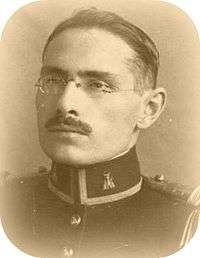João Tamagnini Barbosa
João Tamagnini de Sousa Barbosa (30 December 1883 – 15 December 1948), commonly known as João Tamagnini Barbosa (Portuguese pronunciation: [ʒuˈɐ̃w̃ tamaˈɲini bɐɾˈbɔzɐ]), or Tamagnini Barbosa, was a Portuguese military officer and politician of the Portuguese First Republic (1910–1926). He served as Minister of Interior, Colonies and Finances during the period known as "New Republic", after the coup d'état of the National Republican Party ("Sidonist Party") and the semi-dictatorial government of President/Prime Minister Sidónio Pais, followed by a brief participation in the provisional government of João do Canto e Castro after the assassination of Sidónio Pais.
João Tamagnini Barbosa | |
|---|---|
 | |
| Minister for the Colonies | |
| In office 11 December 1917 – 15 May 1918 | |
| Prime Minister | Sidónio Pais |
| Preceded by | Ernesto Jardim de Vilhena |
| Succeeded by | Alexandre José de Vasconcelos e Sá |
| Minister for War | |
| In office 11 May 1918 – 15 May 1918 | |
| Prime Minister | Sidónio Pais |
| Preceded by | Sidónio Pais |
| Succeeded by | Amílcar Abreu Mota |
| Minister for Interior | |
| In office 15 May 1918 – 9 October 1918 | |
| Prime Minister | Sidónio Pais |
| Preceded by | Henrique Forbes Bessa |
| Succeeded by | António Bernardino de Sousa Ferreira |
| Minister for Finance | |
| In office 9 October 1918 – 23 December 1918 | |
| Prime Minister | Sidónio Pais (October 9, 1918–December 14, 1918) João do Canto e Castro (14 December 1918–23 December 1918) |
| Preceded by | Francisco Xavier Esteves |
| Succeeded by | Ventura Malheiro Reimão |
| 69th Prime Minister of Portugal (15th of the Republic) | |
| In office 23 December 1918 – 27 January 1919 | |
| President | João do Canto e Castro |
| Preceded by | João do Canto e Castro (interim) Sidónio Pais (effective) |
| Succeeded by | José Relvas |
| Minister for Interior | |
| In office 23 December 1918 – 27 January 1919 | |
| Prime Minister | Himself |
| Preceded by | António Bernardino de Sousa Ferreira |
| Succeeded by | José Relvas |
| Personal details | |
| Born | 30 December 1883 Portuguese Macau |
| Died | 15 December 1948 (aged 64) Portugal |
| Political party | Republican Centrist Party later National Republican Party ("Sidonist Party") |
| Spouse(s) | Maria Luísa da Cunha e Silva |
| Children | Maria Helena, Luís Artuir |
| Occupation | Army officer (Brigadier) and engineer |
He briefly served as Prime Minister, after João do Canto e Castro, from 23 December 1918 to 27 January 1919.
After the 28 May 1926 revolution that installed the Ditadura Nacional (National Dictatorship) regime that would be followed by António de Oliveira Salazar's Estado Novo (New State), he served as President of the General Assembly of S.L. Benfica from 25 January 1947 to 29 January 1949. He is regarded as the 18th president of the club.[1]
References
| Wikimedia Commons has media related to João Tamagnini Barbosa. |
| Preceded by Manuel da Conceição Afonso |
President of Benfica 1947–1949 |
Succeeded by Mário de Gusmão Madeira |